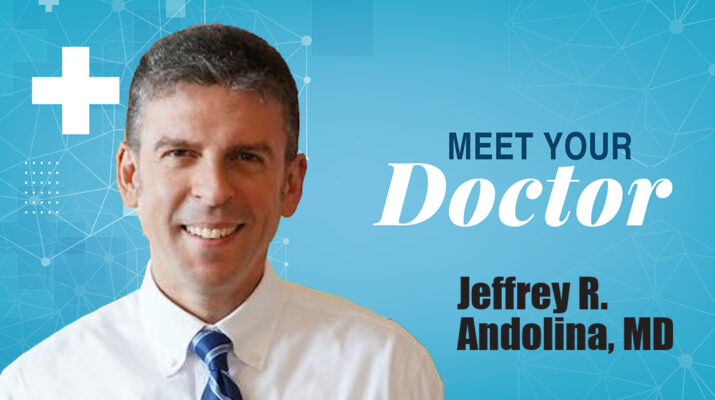URMC physician specializes in treating adolescents and young adults with cancer
By Chris Motola
Q: Tell us about your specialty
A: I’m a pediatric hematologist and oncologist who treats children and young adults with cancer and other blood disorders.
Q: Cancer tends to be a disease more commonly associated with older populations. What’s different about cancer that emerges early in life?
A: Pediatric cancer is, thankfully, relatively rare. The causes of pediatric cancer are generally thought to be caused by random genetic mutations. Adult cancers are often due to inherited genetic causes, environmental causes or lifestyle factors. In children, especially young children, it tends to be random. The vast majority of pediatric cancers are neither inherited genetic nor environmental. I think it can be tough for families to understand that there’s no clear, good reason for why this happens.
Q: So there’s no way to really flag risks?
A: The causes are largely unknown or random. Pediatric and young adult cancers are usually not inherited or environmental. There are a small number of cancers where there is some family history or genetic predisposition, but they’re a minority of cases.
Q: What does the prognosis generally look like for this age group?
A: Children and young adults are generally able to tolerate very intensive treatments including chemotherapy, radiation, surgery and immunotherapy much better than other adults. They’re usually very healthy, without other medical problems. Because of this, kids do much better than adults with their prognosis. At least 80% of them will be cured of their cancers.
Q: That’s without the cancer returning later?
A: Almost all patients will be able to enter remission and about 80% of those will be able to achieve lifelong remission. A lot of that is just due to kids and young adults being healthy and able to tolerate intensive therapies.
Q: Are there particular challenges to treating this population?
A: There are a lot of challenges. I think, when a child is diagnosed with cancer, there’s a huge impact on the entire family, the entire community, the entire school. It can really be overwhelming. With younger children one of the two parents often has to take a leave of absence from their job. It’s obviously very emotional, very tough to have a young child go through chemotherapy treatments. In adolescent and young adult (AYA) patients there are, in some ways, even more challenges. They often don’t have as many support systems as they had when they were younger. Some may be living on their own and may not have a stable situation. They sometimes can be caught in the system between pediatric oncology and adult oncology that can create some barriers to optimal care. Things like health insurance, compliance, mental health, fertility. So it can be more complicated for them than younger children.
Q: Should young people be thinking about what they can do to prevent cancer? Despite most cancers in this age group being random mutations.
A: For younger, healthy children I don’t think there are too many preventive things to do. For young adults, staying on top of your health screenings can help with adult-onset cancers. People think of AYA patients as very healthy, so physicians need to be aware of new symptoms and make sure AYA patients are being evaluated.
Q: How has the field changed during your career?
A: I think there have been great advances in the field of pediatric oncology. For young children in particular, I think there’s been a huge improvement in cure rates for pediatric cancer. This has largely been due to a national cooperative group called Children’s Oncology Group and similar organizations that have developed clinical trials for all children with cancer and helped children across the country receive similar treatment. The treatments themselves are also getting better and safer. In addition to chemotherapy, surgery and radiation there are immunotherapies which consist of things like antibody treatments which have helped improve cure rates. In AYA treatments there’s more awareness that this group needs to be treated differently than both younger children and older adults, which has led to better protocols for them. It’s an ongoing effort to improve cure rates for AYAs. I think the dedicated services and treatments have been great for this group.
Q: What got you interested in treating these groups for cancer?
A: In my training I did a rotation on the pediatric cancer service and was really drawn to it. I got to work with a family through their cancer treatment. In teenagers and young adults specifically we have a population that needs a lot of effort. A lot of them are fun to work with. I think it’s important for them to have a group of doctors and nurses they can really trust. A lot of times teenagers and young adults really like to use technology to communicate. Groups like 13thirty that focus on young adults have been very helpful.
Lifelines
Name: Jeffrey R. Andolina, M.D.
Hometown: Pittsford
Position: Associate professor of pediatrics at URMC; pediatric hematology/oncology/stem cell transplantation; director of pediatric bone marrow transplantation
Education: University of Virginia Medical School, MD (2004); internship in pediatrics, Northwestern University, 2004 – 2005; residency in pediatrics, Northwestern University, 2005 – 2007; fellowship in pediatric hematology-oncology, Northwestern University. 2007 – 2010
Affiliations: Golisano Children’s Hospital, University of Rochester Medical Center
Organizations: Children’s Oncology Group; American Society for Transplantation and Cellular Therapy; American Society of Pediatric Hematology and Oncology
Family: Wife, five children
Hobbies: Playing sports

